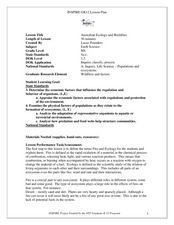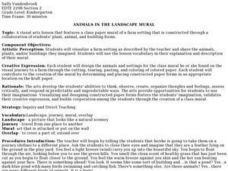Pennsylvania Department of Education
Pennsylvania’s Energy Supply
Third graders become familiar with the various types of energy and which types are found in Pennsylvania. In this Pennsylvanian energy resources lesson, 3rd graders, identify wind and water as sources of energy. Students complete an...
Pennsylvania Department of Education
Wind and Water Wheels
Students identify wind and water as natural resources that create energy. In this natural resources and energy use lesson, students work in groups to construct a pinwheel, then explore the effects of wind and water on the pinwheel....
Curated OER
It's a Small World After All! (Pond Microcosms)
Young scholars use microscopes to investigate the diversity of life that exists in pond water. They then conduct a controlled investigation to study the effect of a pollutant (rice) on a microcosm ecosystem.
Curated OER
Engineering
Students examine how Shell uses engineering. In this engineering principles lesson students visit a web-pages, answer questions, and examine the ways that engineers go about exploring different ideas.
Curated OER
Fertilized Death Water
Students investigate the effect of chemicals on Platyhelminthes and planaria development. They observe the growth and development of planaria and investigate what fertilizer can do to living organisms when it is introduced into their...
Curated OER
Is There A Fungus Among Us?
Sixth graders classify fungus into two different groups. In this fungus lesson, 6th graders collect as many pieces of fungus as possible. Students then classify these pieces of fungus as saprophytic or parasitic.
Curated OER
How Much Carbon is Held by the World's Forests?
Seventh graders identify how much carbon is held by the world's forests. For this forestry lesson, 7th graders study the carbon cycle and discuss what role humans have had on climate change. Students write a one page paper on how the...
Curated OER
Colors of Wildlife
Students observe wildlife animals. In this wildlife lesson, students cut out three different animals from a wildlife magazine. Then they compare the animals, verbally stating their similarities and differences.
Curated OER
Critters in the Classroom
Students investigate with sea urchins. In this ocean habitat lesson, students observe sea urchins and other ocean grazers. Students work with lab equipment to examine the anatomy of these creatures.
Curated OER
Observation Hike
Young scholars participate in an observational hike to study the natural surroundings. In this observational hike lesson, students hike through a state park and observe the plant and animal life. Young scholars learn about appropriate...
Curated OER
It Counts
Students understand and reinforce how numbers are assigned to objects, as well as think about more, less, or equal values. For this lesson, students are asked to describe, compare, and classify plants. They should be able to use numbers...
Curated OER
A Rainbow Under the Sea: How Do Animals Survive in the Ocean?
Second graders, with adult help, create a PowerPoint presentation on a selected ocean animal.
Curated OER
Does the Seed Matter?
Students compare the growth of watermelon from commercial seeds and those harvested from a watermelon. They complete science journals showing these comparisons based on the data they collect.
Curated OER
Rainforest Deforestation and the Water Cycle
Students create terrariums (mini rainforests). They observe and discuss the life processes that occur in their terrariums and how changes in these processes affect the plants and organisms inside. They collect and graph data and present...
Curated OER
If You Mess With A Wetland, At Least Try to Make Amends!
Eighth graders examine the role of wetlands in an ecosystem. In groups, they use the internet to research how humans have disturbed and ruined the effectiveness of wetlands throughout the country. They pretend they are in charge of...
Curated OER
Zen Gardens
Students study the design elements and symbolism of Japanese gardens through a hands-on lesson in Zen Garden design.
Curated OER
Rocks Up!
Students will design and build a structure to support a rock. Students will use their knowledge of movement of objects to determine the proper base to be built to support their rock. Students will explore their natural area for...
Curated OER
Introduction to Ecology
Eighth graders identify the living and nonliving components of an ecosystem. In this ecology lesson, 8th graders explain the role each organism plays. They participate in class discussion and answer a quiz at the end of the lesson.
Curated OER
Give Me Some Air!
Third graders examine how trees produce oxygen. They examine satellite images of the reservation they examining and interpret the number of trees on the land. They determine how natural resources should be used wisely.
Curated OER
Pollution Solution
Fourth graders examine how trees help to absorb the pollution that is emitted from automobiles. They review the process of photosynthesis and determine how forest management is important on their reservation. They think about the...
Curated OER
Saving Hawaii
Students engage in a lesson about the a proposal for a sanctuary in the Northwestern Hawaiian Islands. They write a letter to the President of The United States in opposition to the proposal based upon classroom activities and research.
Curated OER
Australian Ecology and Bushfires
Eighth graders discuss the different types of ecosystem. In this earth science lesson, 8th graders explain the benefits and harm of fire. They research articles about bush fires or controlled burn instance and share it with the class.
Curated OER
Animals in the Landscape Mural
Students design animals and settings for the class mural they find on the visual journey to a farm through the cutting, tearing, pasting, and coloring of colored paper. Visualizing and designing constructed paper forms fosters Students'...
Curated OER
A Walk in the Woods
Students observe an environment, ask questions about what they observe. and design experiments to answer one question they came up with in this upper-level High School or college lesson. The lesson requires an outdoor exploration or...

























